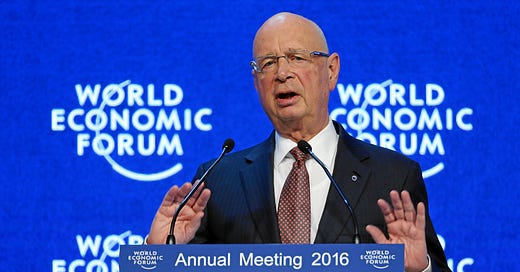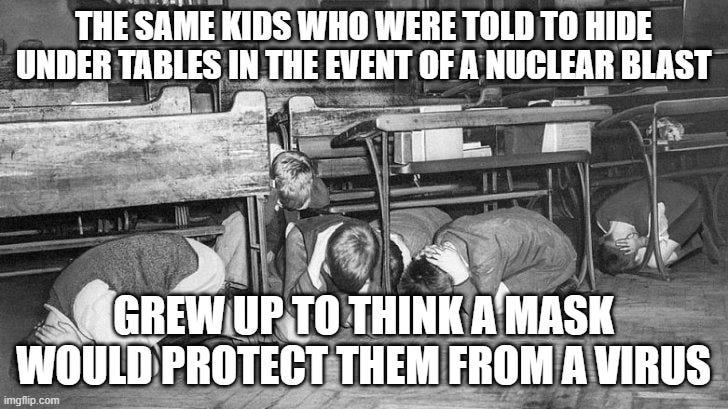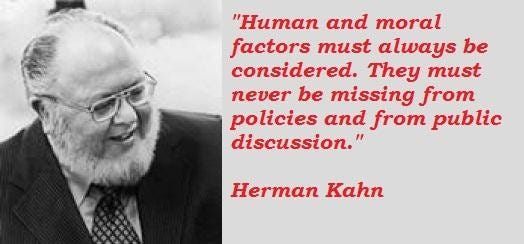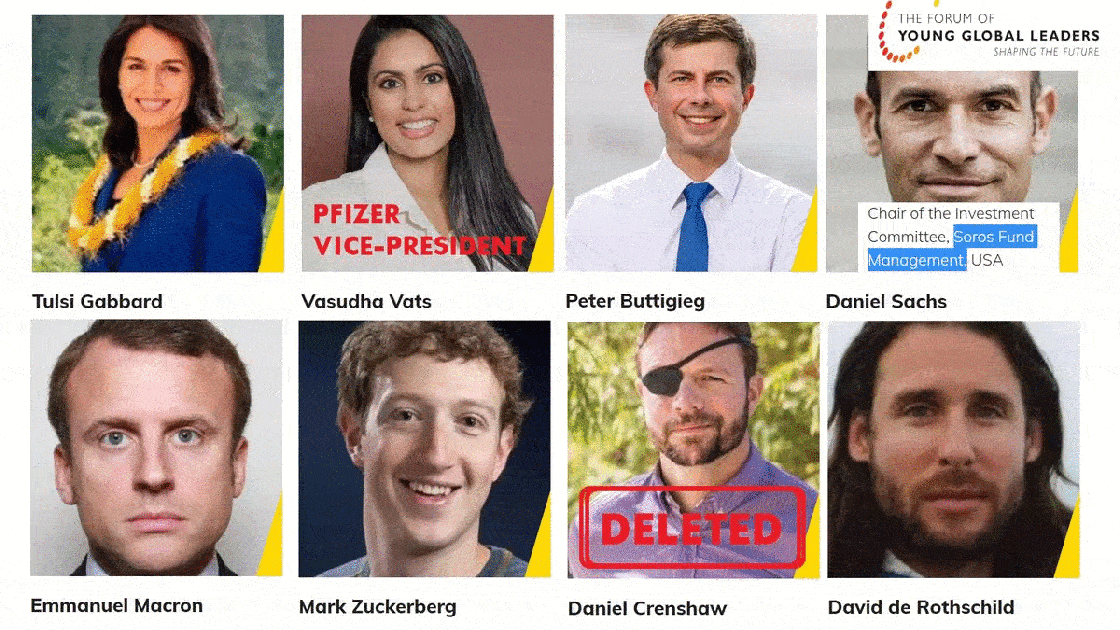Klaus Schwab and the Men Who Molded Him (Part Five)
“There is no greater tyranny than that which is perpetrated under the shield of the law and in the name of justice.” — Montesquieu, French social commentator and political thinker (1689-1755)
It seems fair to say that of all the revelations thrust upon society over the past couple years – from that first suspicion our entire medical establishment is corrupt and immoral to the inevitable conclusion that even this is but a small part of a much darker agenda – it is perhaps the sudden understanding that politics is (in the most explicit sense of the word) theatre which has proved most jarringly illuminating.
Like so many of these bleak epiphanies, it was the Covid hoax which precipitated it. After all, no matter how diligently Joe Public might’ve tried to ignore the relentlessly-sanitized, rigorously-enforced absurdity that was the global pandemic response, eventually, the fiction of a deadly, near omnipotent virus became one untenable to maintain. But while this glimpse behind the curtain failed to warrant further investigation from much of a chronically incurious population, for a great and indeed growing segment, it has now become impossible to look at a TV screen or a Facebook newsfeed and not become increasingly convinced that we live beneath the boot heel of government-by-soap opera.
And right now, in Britain, this diversionary pantomime is in full swing. Following the ousting of World Economic Forum stooge Boris Johnson, the stage has been set for a change in leadership – perspective candidates Rishi Sunak and Liz Truss allowed a little theatrical leeway so long as they keep reading the script written by their puppetmasters in Davos. Of course, this performance is hardly limited to the UK. After dutifully starving his citizens via suicidal climate change decrees, Gotabaya Rajapaksa, the former Cabal-controlled president of Sri Lanka was dramatically forced from power only to be replaced by Ranil Wickremesinghe, yet another globalist mouthpiece whose first act in charge was to plunge the nation yet further into the jaws of a social credit system. Bangladesh, Serbia, Germany, and the Netherlands are all following similar playbooks although by now, it seems inescapable that such scenes will be repeated anywhere and everywhere suffering an infiltration of these WEF sleeper agents.
As many readers will already be aware, the video above shows Klaus Schwab, founder and chairman of the World Economic Forum and therefore man who commands these agents, describing just how he does it. Listening to him, what one is arguably most struck by (aside from Schwab’s cartoonishly villainous delivery) is his candor in outlining the objectives of his Young Global Leaders program, the hand-selected interviewer neglecting to raise so much as an eyebrow when Schwab says:
"So yesterday I was at a reception for Prime Minister Trudeau, and I know that half of this cabinet or even more than half of this cabinet are for actually our young global leaders of the World Economic Forum… It’s true in Argentina and it’s true in France now too.”
Needless to say, if the WEF’s influence is anywhere near as pervasive as Schwab claims it to be – and we can absolutely verify that it is – then things indeed look dire. There is simply no way a country can endure this kind of clandestine invasion without also finding itself veering toward the biometric surveillance society Klaus and his cohorts so openly espouse. Yet with this takeover well underway and with the media and Big Tech abjectly complicit, it seems difficult to imagine a mechanism by which we might extract these saboteurs without also burning the whole system to the ground.
Over the course of this series, it has been my intention to piece together an image of Schwab by profiling those known to have influenced him. In parts one and two, I focused on Klaus’s Nazi-collaborating father as well as his self-described “spiritual mentor”, while in the third installment, I turned to Henry Kissinger, the contentious statesman and renowned Harvard professor ushering his young German protégé into the world of Anglo-American elites. Through Kissinger, Schwab would also be introduced to the famed Canadian-American economist John Kenneth Galbraith. It was his characteristic wit and lyrical dexterity, while speaking at the first ever meeting of the World Economic Forum, that would set the whole operation into motion and yet, Schwab’s fledgling project might still have come to nothing had it not been for a very particular skillset he’d inherited from a man known as “The Real Dr. Strangelove.”
Herman Kahn was born in Bayonne, New Jersey in 1922. His parents Yetta and Abraham were both Jewish immigrants from Eastern Europe, and while they would bring their son up within the faith, by the time Kahn was only ten years old, he was already an outspoken atheist. Originally stationed in the Bronx, the future military strategist would soon be relocated to Los Angeles following his parents’ divorce, eventually enrolling in a Physics course at the University of California. These studies would be interrupted by America’s involvement in World War II when Kahn found himself posted to Burma in the role of a telephone linesman, only to be recommenced upon German surrender.
Financial difficulties would force him to drop out of a subsequent doctorate at Caltech and briefly embark on a job in real estate, but nevertheless, it was clear that Kahn’s immense intellect (he is often attributed the highest IQ ever recorded) had already caught the notice of some formidable figures. Samuel Cohen, known as the inventor of the neutron bomb, had been a friend of Kahn throughout their college years and invited Herman to join him within the ranks of the RAND Corporation. This hyper-influential think tank had been created in the wake of WWII by Air Force general Henry "Hap" Arnold, who contended that a team of brilliant, forward-thinking minds would need be assembled if the US hoped to maintain its technological superiority over the rest of the world.
This was a particularly pressing concern given the context of the Cold War. At the time, the Eisenhower Presidency had set forth a nuclear strategy, as devised by Secretary of State John Foster Dulles, of unconstrained, unrestricted retaliation – an end of days scenario which came to be known as the “New Look.” Its logic seemed obvious enough. With Soviet forces possessing far greater manpower, Dulles and many other prominent voices within the administration insisted that it was necessary, in order to deter any incursion into America’s sphere of influence, that the US must first promise that such aggression would be met with mutually assured destruction.
Kahn considered this approach dangerously simplistic. Basing his projections on both the Systems Theory and Game Theory commonly employed at the RAND Corporation, it was his assertion that, far from dissuading a Soviet attack, the New Look actually invited one. Certainly, given the USSR’s greater troop numbers, American assurances of apocalyptic reprisal only made a Kremlin-ordered first strike all the more tactically advantageous insofar as that, by eliminating Washington’s nuclear capabilities, the Soviets would force Eisenhower into a land war he and his military were woefully underequipped to fight.
Kahn would most thoroughly outline his complex, multilayered ideas in his 1960 publication, On Thermonuclear War - a book which would establish not just much of US policy during the period, but some might also say, the tone and tenor of Cold War paranoia. In it, the author expounds on his belief that the best way to deter nuclear Armageddon was for Americans to emotionally and psychologically prepare for it vis-à-vis the construction of bomb shelters, the implementation of evacuation exercises, as well as the civil defense drills which came to constitute some of the most enduring and defining memories of the era.
What most enshrines Kahn’s legacy within the public consciousness, however, not least through Stanley Kubrick’s cinematic depiction, was his apparent relish in preempting what these post-apocalyptic horrors might look like. Writing in On Thermonuclear War in addition to plenty of his ensuing publications, the 300 pound Mega-mind vividly outlined how stillbirths would become an accepted part of life as well as suggesting that survivors may need to designate contaminated food sources for the elderly on the basis that they would die before being inconvenienced by the effects of the radiation. Because no matter how unfathomable the carnage, at the heart of Kahn’s thesis, is the view that, even if civilization was plunged into a new dark age which lasted for ten thousand years, life would ultimately go on, just as it had gone on after each of the previous catastrophes humanity had endured. Besides, he rather glibly concluded, if the US was incapable of truly confronting the realities of nuclear war, then what precisely were they hoping to achieve by so boldly advertising its willingness to attack?
Megalomania, perhaps not so surprisingly, was an occupational hazard for those working at the RAND Corporation, so much so that Samuel Cohen - the man who had ushered Kahn aboard - would come to describe his colleagues as:
“People who thought they had a God-given ability to know the unknowable. At best, their behavior was hallucinatory. At worst, they were just crooks and liars."
As the author later goes on to note, it was Kahn who appeared most susceptible to these delusions of grandeur. Possessed by the spirit of the doomsayer, he frequently appeared to enjoy the reactions his prophecies would illicit, the futurist’s spectacular girth and trademark bombast making him horrifyingly transfixing viewing for a public deep within the clutches of Cold War anxiety. His job was not to reassure anyone. In fact, given his conviction that society as a whole needed to restructure itself around the threat of nuclear war, it hardly seems unreasonable to suggest that he was actively trying to steer it that direction - Kahn so intoxicated by his own celebrity that he was tempted, in a tale now all too familiar, to stray from the science.
Once more writing in his autobiography, Cohen recalls his revulsion at uncovering the sloppiness of his former friend’s work: computations of Soviet military prowess and projected bomb damage which Kahn had either grotesquely exaggerated or, as was so often the case, clearly invented out of thin air.
"I suspected that Herman had put out his study more for effect and notoriety (which he sure got) than for substance. And I wasn't the only one on to Herman. There were plenty, in and out of RAND, who knew what he had done was basically fraudulent. The trouble was that he already had made his mark and a huge impact on Washington officialdom, which in those days liked hearing horror stories like this."
Suffice to say, Herman Kahn was a divisive figure. For many, he came to embody the unbounded arrogance of political elites - an arrogance which, far from being limited to some inconsequential boardroom in DC, instead nudged mankind toward annihilation merely by proposing that nuclear war might be winnable. That said, neither was Kahn bereft of supporters. These individuals typically argued that while his forecasts were self-evidently harrowing, so too were they terrifyingly plausible, and in the end, all Kahn was doing was assuming a responsibility few possessed the mind, much less the stomach, to be capable of assuming.
In addition to his role at the RAND Corporation as well as his co-founding of the Hudson Institute, Kahn would also lend his contentious genius to a host of other advisory boards and policy institutes, perhaps the most notable being the Counsel on Foreign Relations. As those who have kept abreast with this series will hopefully remember, it was here that he was introduced to Henry Kissinger and John Kenneth Galbraith. As noted in parts three and four, there existed within the CFR a widespread if seldom-spoken ambition to extend American influence into Europe, and in the young Klaus Schwab, Galbraith, Kissinger, and Kahn recognized an opportunity to do just that.
In 1970 and in the company of John Kenneth Galbraith, Kahn would travel to Davos in order to bolster support for Schwab’s first European Management Symposium (as the World Economic Forum was then known). The presence of both men was a major coup for the still-embryonic organization, although one need dig only a little deeper to see that Kahn’s legacy within the WEF lingers in a far more tangible sense.
Several years earlier, in 1967, Kahn had headed a project conducted at the Hudson Institute which sought to explore how his vision for the future might be applied within wider society. The findings of this are broad-reaching, touching on various levels and aspects of the education system. Still, one passage in particular stands out:
“The desirability of explicitly educated decision-makers so that they are better able, in effect, to plan the destiny of the nation, or to carry out the plans formulated through a more democratic process, should be very seriously considered. One facet of this procedure would be the creation of a shared set of concepts, shared language, shared analogies, shared references… Universal re-teaching in the spirit of the humanistic tradition of Europe – at least for its comprehensive leadership group – might be useful in many ways.”
This, it seems almost redundant to say, is a pretty spot-on description of the World Economic Forum’s Young Global Leaders program. In fact, this paragraph may well represent its conception. Possessing an unerring faith in their divine right to rule and remaining wholly unconcerned with the wants of the common man, both Schwab and Kahn viewed the creation of this enlightened nobility as integral to stability within Europe, an aspiration which has since blossomed – if one can even use such a term– into the civilization-subverting machine the WEF is today. As is stated on their website:
“Our growing membership of more than 1,400 members and alumni of 120 nationalities includes civic and business innovators, entrepreneurs, technology pioneers, educators, activists, artists, journalists, and more. Aligned with the World Economic Forum’s mission, we seek to drive public-private co-operation in the global public interest. We are united by the belief that today’s pressing problems present an opportunity to build a better future across sectors and boundaries.”
It seems safe to assume that a vast majority of readers here at Midnight at the Matinee are already well aware of the kind of alumni Schwab’s Young Global Leaders scheme produces. Between Emmanuel Macron, Justin Trudeau, and Jacinda Ardern, some of the most heavy-handed enforcers of Covid tyranny have passed through its doors. So too have Bill Gates, Jeff Bezos, as well as a host of Big Pharma executives - individuals you no doubt recognize as those who made out most profitably from the health diktats of their classmates. Alongside them, Schwab has also helped shape the likes of Angela Merkel, Tony Blair, and Richard Branson; Bono, Nicolas Sarkozy, and Ibram X Kendi, all of whom have pledged, as a condition of their entry to the program, allegiance to the WEF’s “Build Back Better” agenda.
Naturally, it is easy to balk at the phrase, yet after some thirty months of the willful, systematic dismantling of western institutional norms, it is clear that this is much more than just another failure of bumper sticker politics. The contours of this globalist plot first became apparent during the earliest days of the Covid power grab when, despite the widespread availability of therapeutics like vitamin D, zinc, and ivermectin, we witnessed governments in more than 190 countries, in near perfect lockstep, not only deny the public access to these treatments, but insist instead upon a policy of masks, social-distancing, experimental medical procedures, and of course, digital IDs. These were pursued not because of their efficacy, much less their safety, but rather because they are the first step toward establishing Schwab’s New World Order, and now with the climate change scam hotting up in Europe, we are once again seeing these same solutions being proposed for ostensibly unrelated problems. This pattern is intended to be continued for as long as it takes to traumatize humanity into accepting the waking death of a carbon-based social credit system, wave upon wave of injustice and brutality set to be inflicted by the network of Schwab-trained infiltrators first envisaged by the brilliant, terrible, terrifying mind of Herman Kahn.
***As I’ve stated throughout this series, a special note should be made to investigative journalists Michael McKibbon and Johnny Vedmore. It really is no exaggeration to say that a majority of what the world knows about Klaus Schwab they know because of these men - a body of work I hope to add to in the sixth and final part when I profile a philosopher whose thinking would greatly refine the WEF founder’s transhumanist ambitions. ***
Crypto Donations:
Bitcoin: 1MHzr38VAc3g5cucBGiT8axXkiamSAkEkZ
Ethereum: 0x9c79B04e56Ef1B85f148CaD9F4dBD4285b2f9E69










